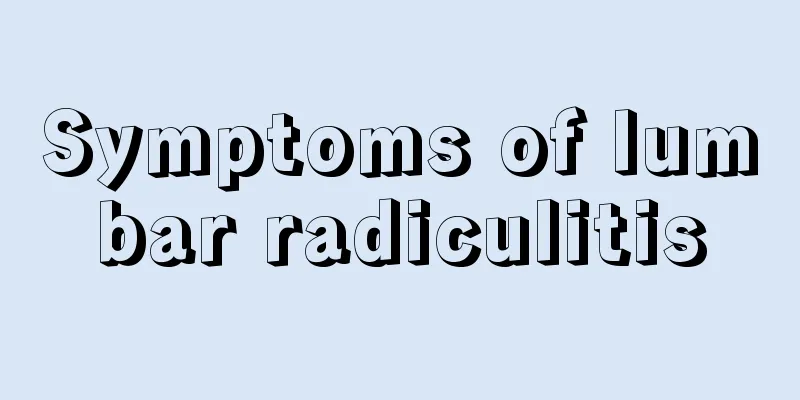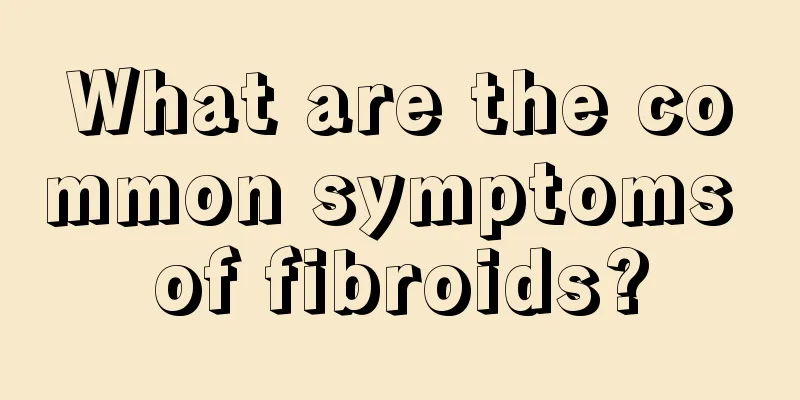Symptoms of lumbar radiculitis

|
Lumbar radiculitis is a relatively serious neurological disease, which mainly refers to the inflammation of the nerves in the lumbar sacral area due to bacterial infection, etc., which causes serious damage to the lumbar spine. Patients with lumbar radiculitis often feel discomfort in the lumbar spine. Sitting or standing for a long time will put a lot of pressure on the lumbar spine, so anti-inflammatory treatment is needed as soon as possible. So, what are the symptoms of lumbar radiculitis? Radiculitis is a general term for inflammatory or degenerative lesions of the spinal nerve roots caused by various reasons. The lesions can affect the spinal nerve roots of any segment of the cervical, thoracic, lumbar, and sacral segments. Clinically, the cervical and thoracic nerve roots and lumbar and sacral nerves are most commonly affected, which can cause shoulder and back pain and low back and leg pain. Causes There are many causes of radiculitis, and the causes of intradural and extradural radiculitis are also different. Intrathecal radiculitis is often caused by infection, poisoning, nutritional and metabolic disorders, etc.; extrathecal radiculitis is often caused by local cold, moisture, muscle and transverse process trauma and inflammation, etc. The lesions of intramembranous radiculitis are often extensive and bilateral; the lesions of extramembranous radiculitis are often more limited and unilateral. Clinical manifestations The onset of cervicothoracic radiculitis is more common in acute and subacute forms, and is often manifested by pain, numbness, and weakness in one or both sides of the shoulder and arm. The pain often radiates along the distal lateral or medial side of the upper limb and worsens with coughing, straining, and defecation. The above symptoms are often obvious after exposure to cold or fatigue, and are alleviated after warmth and rest. Examination may reveal hypersensitivity (early stage), reduction or disappearance (late stage) of sensation in the area innervated by the affected nerve roots; weakened or disappeared biceps and triceps tendon reflexes; mild atrophy of upper limb muscles; and tenderness near the corresponding cervical and thoracic vertebrae. In addition, there may be autonomic nervous system symptoms such as changes in skin temperature and color, nutritional and sweat gland secretion disorders. treat Eliminate the cause of the disease, improve neurotrophic metabolism and promote the recovery of nerve function. 1. Etiological treatment to control various infections and diabetes, etc. 2. For drug treatment, you can choose prednisone or dexamethasone, and use B vitamins, coenzyme Q10, citicoline and other drugs at the same time to promote nerve repair and functional improvement. You can also use dibazole, galantamine, potassium iodide, etc. to improve circulation and promote inflammation absorption. For those with obvious pain, you can use carbamazepine or phenytoin sodium for treatment. 3. Physical therapy, local hot compress and massage all have certain therapeutic effects. |
<<: Symptoms of measles, mumps and flu
>>: The benefits of green coconut juice
Recommend
Can six-month-old babies eat yam?
The gastrointestinal system of a 6-month-old baby...
What are the symptoms of advanced colorectal cancer
In recent years, cancer has become one of the maj...
What are the dangers of moderate bicuspid aortic regurgitation?
Mitral regurgitation may lead to congestive heart...
Colon cancer can be treated in a variety of ways
Colon cancer can be treated in many ways, and the...
How to arrange reasonable medication for teratoma in daily life
Teratomas are best treated surgically. Teratomas ...
How to use medication for glioma
The frequency of gliomas is gradually increasing....
How many degrees is 45 vision
In recent years, children's eyesight has been...
8 health-preserving recipes to remove dampness in midsummer and help you feel lighter and cooler
Method 1 for removing dampness: Less salt to help...
Is intervention useful for advanced liver cancer? How long can one live after interventional treatment for advanced liver cancer?
Everyone knows that cancer is the number one kill...
Reasons for acne around the neck
There are a lot of lymph nodes around the neck, s...
What can I eat to relieve heartburn immediately?
Because of bad eating habits and lack of attentio...
How to deal with too many bayberries
When it comes to the season for eating bayberry, ...
What is the cure rate for HER2-positive breast cancer
What is the cure rate for HER2-positive breast ca...
Importance of brushing teeth
Brushing teeth is something people must do in the...
There are small thorns on the grapes
People who love fruits must have encountered this...









